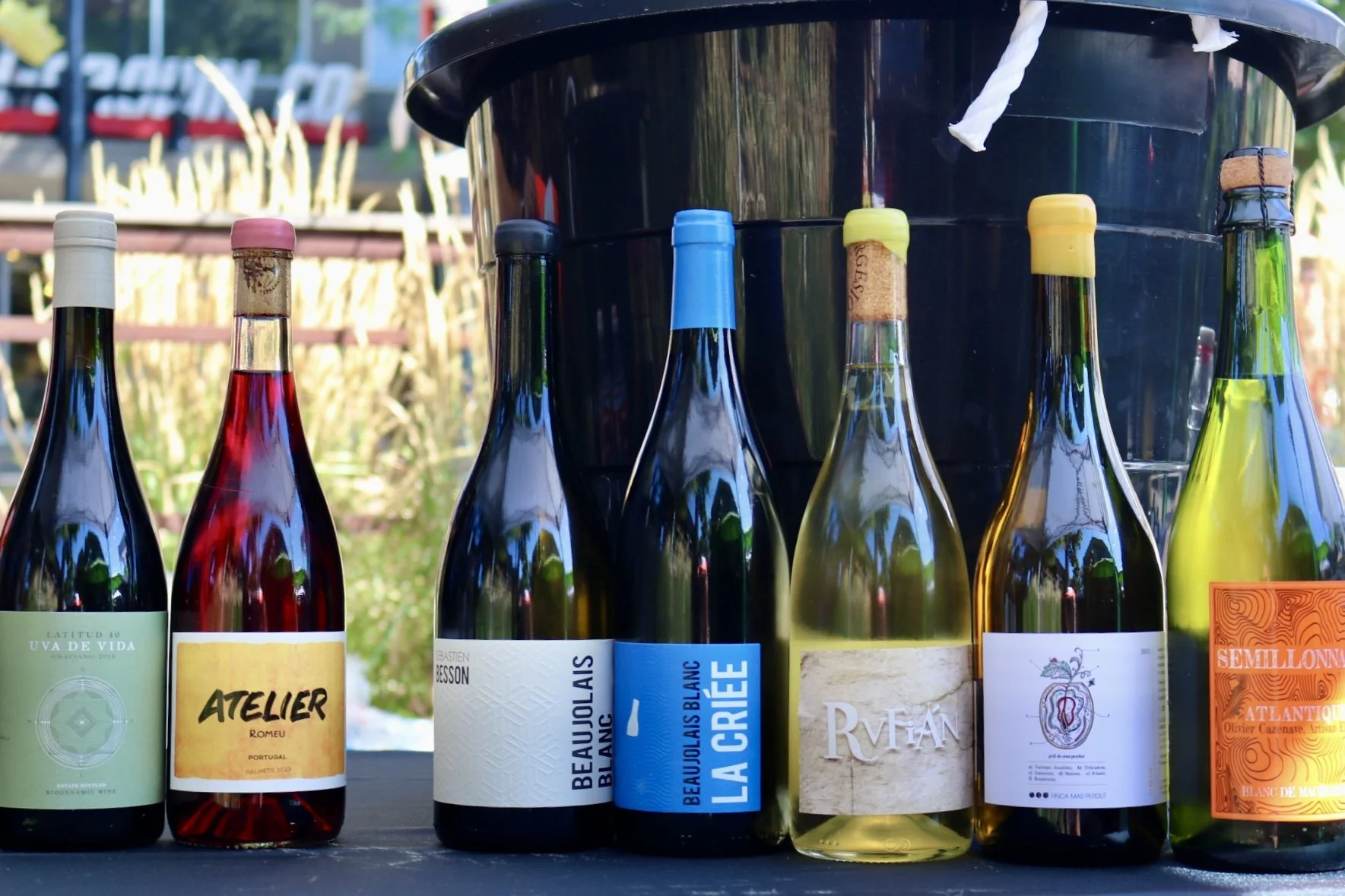Here’s what we love about it!
Becky and Scott’s decision to sell natural wine at Tea Zaanti is in direct correspondence to our shop philosophies of practicing sustainability, honoring tradition, and fostering meaningful connections. In maintaining relationships through having diverse conversations with small-scale natural winemakers over the years, we have all learned a ton about the process of natural winemaking.
That being said, I am super excited to be able to dive into this world of natural winemaking with you! In this blog post, I will spill what it’s all about and how it stacks up against conventional winemaking.
Tea Zaanti staff sippin’ on some natural wine!
Martha Stoumen’s Post Flirtation being opened at our Sugarhouse Natural Wine Party 2024!
Here is a detailed list of these principles that natural winemakers commonly adhere to when curating their wines:
Natural winemakers use organic and/or biodynamic grapes. Natural wine starts in the vineyard where grapes are grown organically and picked by the winemakers themselves. In other words, these grapes are typically grown without synthetic pesticides, herbicides, or fertilizers and are untouched by the machinery used in conventional harvesting/picking processes.
Natural winemakers trust spontaneous fermentation. Instead of using commercial and/or lab-grown yeasts, natural winemakers tend to rely on wild yeasts for the fermentation process. These native yeasts are often found on the grape’s outer layer, thus they naturally occurred in the vineyard. (Wine fermentation is the process of converting grape juice sugars into alcohol– this process typically takes place in a fermentation vessel, such as an oak vat/barrel or stainless steel tank).
Natural winemakers tend to avoid additives that are used in conventional winemaking processes. That being said, natural wine typically contains little to no sulfites, whereas conventional wine utilizes much higher amounts of so and in differing ways. Conventional winemakers tend to add sulfites to the grapes to kill off the wild yeasts, and then they add a bit more throughout the rest of the process. Natural winemakers however, will sometimes add a little bit right before bottling to preserve its most authentic taste. It’s important to note that natural winemakers also avoid adding in sugar, acid, egg whites, isinglass, and fake flavorings that are commonly included in conventional wines.
Natural wine is unfiltered and unfined. This winemaking process is “low-intervention”, meaning the naturally occurring compounds, such as yeast and other particles, are not being removed. Though this results in some cloudiness, this means that the wine’s most authentic self is being preserved!
More delicious natural wines!
When winemakers craft their wines, they are typically going through two parts of a long process: growing and picking their grapes for the wine, and then turning them into the juice itself through fermentation practices (the process of using yeast to break down sugars and transform said juice into alcohol). In conventional winemaking, the process of curating wine typically involves many areas of manipulation. However, the process of making natural wine relies on very minimal control.
Moreover, when it comes to picking the grapes, natural winemakers pick them themselves rather than relying on heavy machinery to harvest them. When it comes to making the wine, natural winemakers use wild and native yeasts rather than lab-grown yeasts. And when it comes to additives, such as sulfites, colorants, flavor enhancements, stabilizers, etc.) natural winemakers use little to none.
Rvfian Rvfete by Microbio being poured at our Sugarhouse Natural Wine Party 2024!
Some of our regulars enjoying a yummy glass!
Some epic benefits of drinking natural wine that are in connection to the guidelines listed above:
It’s pure and organic! With less additives and chemicals, natural wine is considered to be a bit healthier as the drink itself is a bit more pure. Plus, you’ll often hear that natural wine causes fewer hangovers due to the reduced amount of sugar
It’s sustainable! The process of natural winemaking prioritizes environmental conservation, thus supporting biodiversity and soil health.
It’s so authentic! People have been making fermented grape juice without additives and/or high intervention methods for centuries. Many natural winemakers embrace this tradition and honor the authenticity of so.
The natural wines we choose to sell offer a connection to the craft behind each bottle. Sipping on these wines not only invites a fun, funky, and overall nuanced tasting experience, but it also becomes an opportunity for customers to connect with the winemakers themselves and to appreciate the simplicity of something truly authentic and meaningful.
Our natural wine list is constantly evolving, so stay tuned for a blog post that includes an updated selection! Future posts will go into detail about specific bottles and glasses we sell.






